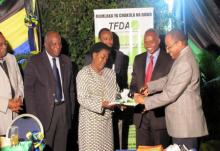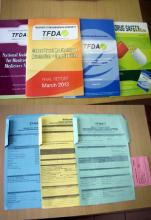Tanzania Food and Drugs Authority (TFDA) launches the final report of active surveillance of Artemether-Lumefantrine and pharmacovigilance tools
On 11th May, 2013, the Tanzania Food and Drugs Authority (TFDA) launched the final report of the active surveillance of Artemether-Lumefantrine (ALU) and pharmacovigilance tools. Present to officiate the launch was the Minister for Health and Social Welfare, Hon. Dr. Hussein Mwinyi, the Ag. Permanent Secretary, Mrs. Regina Kikuli, the Ag. Chief Medical Officer, Dr. Donan Mmbando, the Director General for TFDA, Mr Hiiti Sillo and the WHO Representative, Dr. Rufaro Chatora.
Others present included: parliamentarians, regional and medical officers from the 25 Regions, senior management officials from TFDA and Ministry of Health and Social Welfare, representatives from private sectors, development partners including staff from WHO and members of the media.
The Minister for Health and Social Welfare in his speech commended TFDA for demonstrating exemplary leadership in fulfilling its role to protect and promote public health by ensuring quality, safety and effectiveness of drugs. Minister thanked all health care providers and health care facilities that participated in the Cohort Event Monitoring of ALU. “It is indeed a great achievement that we can now confidently say that ALU is safe with no adverse drug reactions. I urge everyone to continue using ALU for treatment of Malaria.” the Minister said. He further encouraged all health professionals to use the new guidelines and manuals and ensure timely submission of reporting forms to TFDA. The Minister thanked WHO for financial and technical support in the implementation of Cohort Event Monitoring of ALU and antiretrovirals in the country. He concluded by urging TFDA to share information about drugs safety to health professionals and particularly engage the media in dissemination of such information to the general public.
The Director General for TFDA, Mr Hiiti Sillo in his welcome remarks highlighted the role of TFDA in protecting and promoting public health by ensuring quality, safety and effectiveness of food, drugs, cosmetics and medical devices through voluntary/spontaneous adverse drug reaction reporting system and active surveillance system. Mr. Sillo then proceeded to elaborate on the findings of implementation of the Cohort Event Monitoring system in the pharmocovigilance of Artemether and Lumefantrine (ALU) and announced ALU as a safe drug with no adverse reactions. Other achievements highlighted in his speech included completion of the Drug Safety Bulletin, Guidelines for Monitoring Medicines Safety, Pharmacovigilance Training Manual for Healthcare Professionals, Yellow, Blue and Green Forms for reporting spontaneous adverse drug reactions, drugs quality defects and minor side effects and Patient Alert Card.
The WHO Representative, Dr. Rufaro Chatora, in his remarks emphasized that effective functioning of national medicine regulation and control systems is the only means to assure safety and quality of medicines and to protect members of the public from drug-related tragedies. He added, “particularly with new medicines, such as the ALU, early identification of unexpected adverse reactions and their risk factors is essential, so that the medicines can be used in an informed manner with the least chance of harm”.
Emphasizing the role of pharmacovigilance in providing evidence of medicine-related problems, Dr. Chatora said, “Vigilance in diseases of public health importance such as Malaria or HIV is very crucial as significant harm to a few patients due to ADRs can destroy the credibility, adherence to and success of a programme. Rumours and myths about the adverse effects of medicines can spread rapidly and are difficult to refute in the absence of good data”. Dr. Chatora concluded his remarks by commending the government of Tanzania for pioneering the Cohort Event Monitoring system for active surveillance of safety of ALU and antiretroviral medicines and encouraged health professionals in Tanzania to see the importance of pharmacovigilance and report patient safety concerns to TFDA either through spontaneous reporting or active surveillance.




